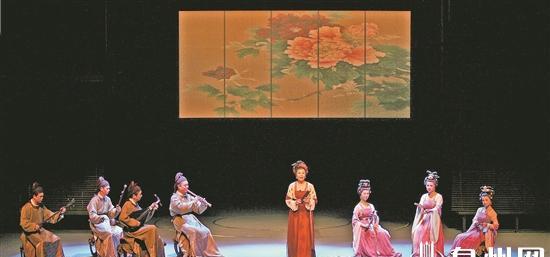Millennium Gagaku has a new sound
This year's Spring Festival, Quanzhou has become a tourist destination for many people at home and abroad, listening to Nanyin in the ancient city, which makes many tourists feast their ears; more young people join the inheritance and performance of Nanyin, interpreting Nanyin in a form that the public likes to hear
Quanzhou Network, February 11 (Reporter Xie Weiduan) During this year's Spring Festival, in many places in quanzhou's ancient city, the ancient rhyme of Nanyin echoed. Among them, there are both traditional repertoire and innovative repertoire; there are both online exhibitions and offline performances, so that visitors to The Springs can feast their ears and linger.

Qingya's Nanyin performance (Photo by Chen Qituo)
The Quanzhou Folk South Music Team has performed at the Xi'an Conservatory of Music. (Photo by Chen Qituo)
Young people in Quanzhou promote Nanyin to the whole country in cCTV programs (Photo courtesy of interviewee)
For many people, in the air of the ancient city of Quanzhou, the indispensable is the southern sound of Yuanyuan. During the Spring Festival, Quanzhou Nanyin Heritage Center performed a number of Nanyin Intangible Cultural Heritage performances. The fourth day of the first lunar month is the offline Nanyin special session "Tang Feng Song Yun", the tang dynasty great poet Zhang Ji's masterpiece "Fengqiao Night Berth", the Southern Tang Dynasty lord Li Yu's "Langtaosha , Rain Outside the Curtain Babbling", the famous Tang Dynasty poet and literary scholar Liu Yuxi's essay "Buried Room Ming", the Tang Dynasty's most famous poet Li Bai's "Will Enter the Wine", "Remembering Qin'e ZhenSheng Throat" and "Quiet Night Thinking", the famous patriotic poet Lu You's "Chaotou Feng", and "Walking Horse", one of the four famous scores of Quanzhou Nanyin, the actors interpreted them one by one with Nanyin. "The playing techniques are colorful and the melodies are dynamic. "Phoenix" tells a poignant love story between Lu You and Tang Wan, and it is even more beautiful to play through the southern tone. Mr. Qian, a Shanghai tourist who has heard the special session, said. The "Encounter silk rhyme" Nanyin special session of the sixth grade is also offline special, and the whole performance excerpts the five storylines of "Encounter under the Lamp", "Dark Lovesickness", "Throwing Li Love", "Mutual Heartfelt Feelings" and "Determination to Elope" in the story of "Chen Sanwuniang", with the relative Nanyin repertoire, with the first singing section of the Nanyin famous song "Lantern Fifteen" as the aria, connecting the cutscenes of each scene, supplemented by the prologue and epilogue. The prologue begins with Quanzhou Nanyin disciples entering the museum to worship and learn Nanyin, and the ending note ends with Nanyin disciples offering back musical instruments, and embedding the Nanyin traditional ceremony "taking over" in the middle, which is intended to let the audience enjoy Quanzhou Nanyin at the same time, understand the form of Quanzhou Nanyin generations of inheritance and the elegant character of Nanyin people. "Before, I only knew the story of Liang Shanbo and Zhu Yingtai, and I never thought that the story of Chen Sanwuniang in Quanzhou was also so poignant and moving." Ms. Huang, a tourist from the northeast, said. On the fifth day of the first lunar month, the center broadcast "Martyrs' Temple Caprice" online. In addition, many Nanyin Transmission Institutes, Nanyin Societies, Nanyin Associations and folk Nanyin Pavilions also carry out performances or teaching activities around the Spring Festival.
Nowadays, many young people in Quanzhou have also joined in the inheritance and performance of Nanyin, and they interpret Nanyin in a form that young people like to hear. A few days ago, Quanzhou's local band "Double Ming Not Fresh Idol Group" sang "Straight into the Nanyin Garden" on CCTV, which attracted netizens to praise. "Kicking off the prelude to history, this is my attitude, the reputation of the shijing shizhou people in ancient times, Yunshan Baiyue Road, noodle paste, meat dumplings, soil shoot jelly, radish salty rice into the belly, full of happiness, sent into thousands of households in the ancient city..." Recently, 23-year-old Quanzhou boy Wu Xuanhui in the CCTV large-scale original music program - "Sing My New Voice", presented a tide play music full of southern Fujian cultural elements "Quanzhou", this electronic rap and Nanyin mixed song not only in the circle of friends of the citizens. It also made more people pay attention to and love Nanyin and Quanzhou. The Xinshui Nanyin team also launched the self-titled album on the Internet, which contains ten well-known Nanyin new editors, "Xinshui Nanyin" flows with the melodious melody of the atmosphere and the cultural charm of southern Fujian, deeply rooted in the strong national color, and radiates unique recognition and vigorous vitality in the collision and fusion of tradition and modernity.
It is understood that Quanzhou Nanyin is one of the oldest surviving music genres in China, with its large number of repertoire, ancient instruments and self-contained notation methods, continuing the bloodline of Chinese music since the Han and Tang Dynasties. With its long musical history and diverse cultural characteristics, Nanyin is known as the "living fossil of Chinese music history", and in 2009, Quanzhou Nanyin was officially included in the UNESCO Representative List of intangible cultural heritage of humanity. Nanyin is not only loved by the local people, but also spread overseas with the footprints of successive generations of Quanzhou people, becoming a spiritual link between overseas Chinese and Taiwan compatriots to maintain nostalgia.